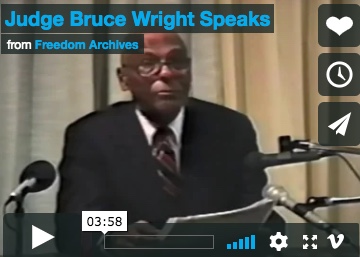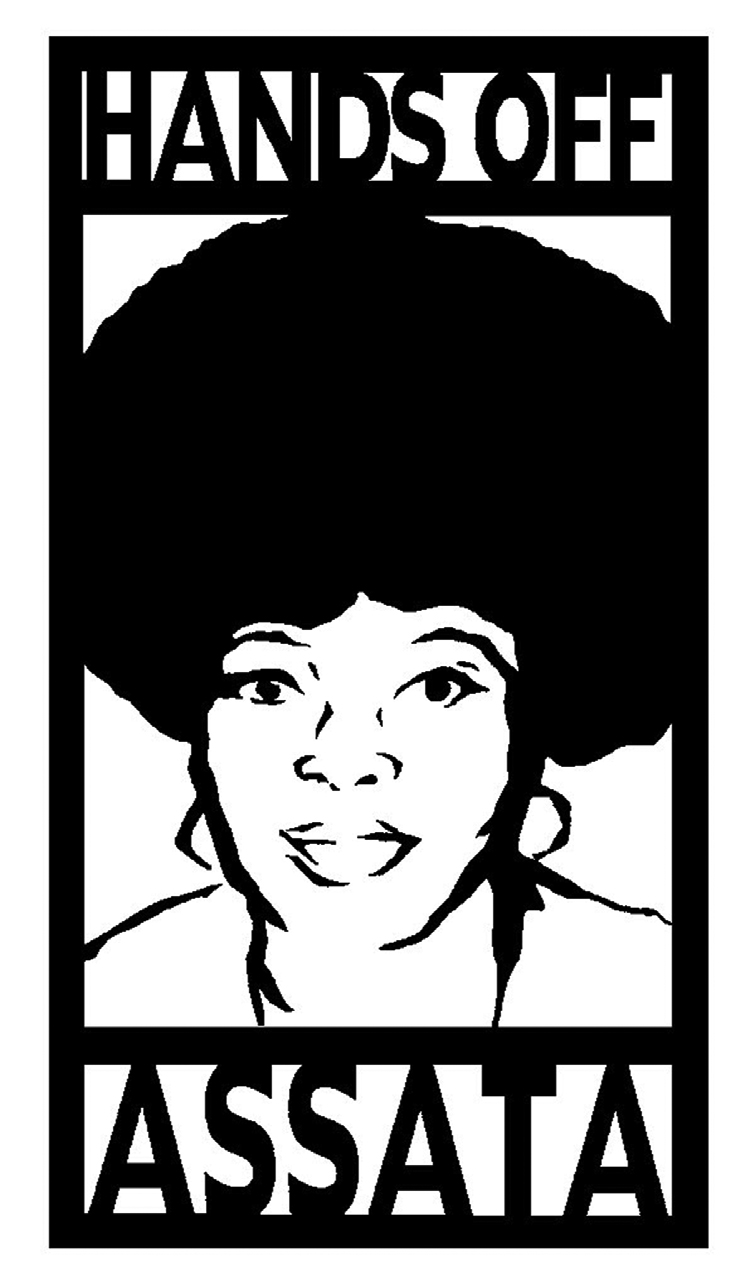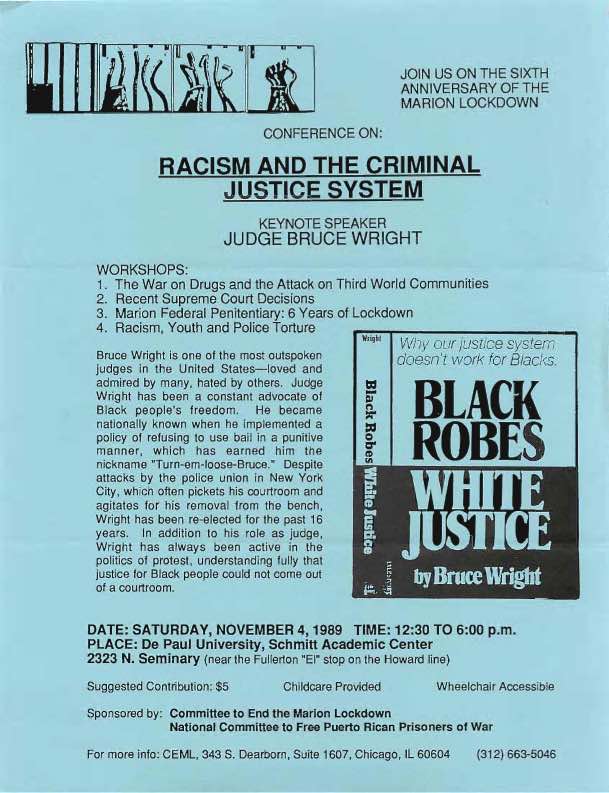Out of Control: Chapter 15–Do the “Wright” Thing, or
Bangs and Whimpers, 1989
That summer of 1989 we brainstormed about what to do for our fall program. It was no longer a question of “should we have a fall program?” but only “what should it be?” We decided to hold a conference that would address racism in the criminal justice system overall. We approached the National Committee to Free Puerto Rican Prisoners of War to co-sponsor the event and they agreed.
We had just finished reading a wonderful book entitled Black Robes, White Justice by an African-American New York Supreme Court Judge. Bruce Wright had been a judge for over 19 years, and a New York State Supreme Court justice since he was first elected in 1982. He was also a published poet and edited a volume of poetry along with Langston Hughes. His resume revealed a long list of honors and awards, but he was perhaps most well-known for his controversial policy of refusing to demand excessive bail from poor defendants. In fact, he was referred to by friends and enemies alike as “Cut ‘Em Loose Bruce,” as a result of his implementing this policy of refusing to use bail in a punitive manner. Despite attacks by the police union in New York City, which often picketed his courtroom and agitated for his removal from the bench, Wright had been re-elected for the past 16 years.
We decided to invite Judge Wright to be the keynote speaker at our conference. We weren’t optimistic he would be willing to come to Chicago, but we thought we’d give it a shot. His initial response to my letter of invitation was negative. He said he was very busy and hated to leave his two-year-old son. He nonetheless encouraged us to send him some of our literature, and during the follow-up phone call, he agreed to come and speak. I was in charge of corresponding with Judge Wright, and I knew from the written communications (that was before e-mail) that he was going to be a treat to host. The very top of his letterhead read: THOREAU-WALDEN-DURANCE VILE-RACISM QUIET DESPERATION SOCIETY, LIMITED.
Judge Wright informed us that he would be glad to sign copies of his books, “if anyone wants that sort of thing. As my father wanted me to be a doctor, my handwriting is execrable. It is of the kind that must have inspired Arthur Koestler to say that he preferred the neat and legible script of the illiterate.” Judge Wright also indicated that he had to turn down an invitation from the National Conference of Black Lawyers, although he “dearly loved” that organization both as a founder and as a client. “Every time I have been on charges, the NCBL has come expertly to my rescue.” But he preferred to return to New York the very night of the program because, “At my age [72], I will have little enough time to spend with my new son.” The Judge then signed off: “In the cause of that damned elusive Pimpernel known as justice, I am honored to subscribe myself Your obedient servant, Bruce McM. Wright.
Luck was on our side. As it were, the American Friends Service Committee (AFSC), an organization founded by the Quakers, was commemorating the 200th anniversary of the penitentiary in the following year. That fact has special importance to the AFSC, since it was the Quakers who conceived of the penitentiary (named thusly because one could do penance in the solitude) as a humanitarian alternative to the openly brutal corporal punishment of 200 or so years ago. As part of their commemoration they were making grants available to organizations doing relevant work around prisons. We were fortunate enough to receive such a grant to produce the conference and bring Judge Wright from New York.
As was characteristic of our work, the upcoming conference was a device that mobilized us to organize for months leading up to it. (It always seems strange to me that left groups sometimes call conferences but then expect them to organize themselves. When 15 people show up, they are surprised or blame people for not coming. But in truth they have not planted the seeds, or weeded or watered, yet hope to reap the crop.) What a shame it would be to utilize resources and have the Judge amongst us without reaching everyone we possibly could to inform them of his upcoming presence and to educate them about the situation at Marion. We worked diligently in preparation for this, as we had for all our events. We reprinted all of our literature.
By now we had a substantial collection of materials, and we distributed our “Resource List” wherever we went. In addition, we ordered 50 copies of Black Robes, White Justice, as well as 100 copies of the recent issue of The Nation magazine focusing on the Black family and written almost entirely by Black women. We transcribed the message to last year’s conference from Assata Shakur, the political prisoner who had escaped and was writing from exile in Cuba. We produced it as a pamphlet along with some of her poetry.
A packet was distributed to all participants that included: “Reflections on Six Years of the Lockdown” by numerous prisoners at Marion; a statement to the conference from the well-known political prisoner, then on Death Row in Pennsylvania, Mumia Abu-Jamal, the Black prisoner our who was and is still facing the death penalty in Pennsylvania; our petition to change the water situation at Marion; and a “What You Can Do To End the Marion Lockdown” flyer. We always tried to leave people with an array of reading materials to take home, and had a person dedicated to creating the materials for the event and staffing the literature table. Our outreach involved all the usual mailings and leafleting of events.
We were helped by many friends who mailed out our leaflets or listed the conference in their calendars, most notably the Illinois Coalition Against the Death Penalty and the 8th Day Center for Peace and Justice. We contacted about 40 or so groups, divvying them up between all members of the Committee. We were able to show our video many times in the two months before the conference, at universities, law schools and community gatherings.
Madison, the capitol of Wisconsin, was an important area for our work because people there could continue to apply pressure to Congressman Kastenmeier to do so something. The Women’s Jail Project and other friends in Madison were able to arrange a speaking engagement at the University of Wisconsin for our good friend Morton Sobell. Mort, who never accepted even one penny from us, came to Chicago about two weeks before the conference and spoke also at an alternative high school and Kent Law School before heading off to Madison. There he was interviewed by two newspapers, did two long radio shows and delivered his main speech to a large evening audience at the University. At each step, Mort stressed the importance of the Marion work and the upcoming conference.
One tremendous strength of our work was that at each step of the way we not only urged people to join the work but we had multiple possible activities for them to do: write a story for a local publication, show our slideshow to friends, come to hear Judge Wright, join our demonstrations, etc. Our “educational” events were never purely educational. We always organized them in a way that encouraged others to join the work and gave them not empty exhortations to help, but specific paths to joining or assisting in the work. All of this required more and more work on our part but we were all in it with both feet.
Of course we could never do something as simple as a single keynote speaker! Instead we organized a six-hour conference—”Racism and the Criminal Justice System”—on a Saturday afternoon. We would have four workshops with a CEML member moderating each one. Each moderator reiterated the plan for future work and a specific time and place that people could join us. Our November activity with Judge Wright began with a showing of our video, “Shut Down the Control Units.” By now our 30-minute slideshow had morphed into a video, thanks to the all-volunteer effort of one Michael Misrock, a Chicago filmmaker who later died of AIDS. Michael and his friends, Cindy Moran and Eric Scholl, worked long and hard with the assistance of committee members Stephen Oscharoff, Fred Deppe, and Sharon Powell. Following the video, we broke up into four workshops.
One of the four dealt specifically with Marion Federal Prison, with an update from attorney Jan Susler, Lourdes Lugo, speaking from the perspective of a relative and a Puerto Rican independentista, and Kimberly Fitzgerald, a member of CEML describing her own involvement and encouraging others to join us. I moderated the workshop entitled the “War on Drugs.” The first panelist was Dr. Robert Starks, doctor of political science, of the Center for Inner City Studies at Northwestern University and Chair of the Task Force for Black Political Empowerment. He spoke in great detail about how the “war on drugs” is an essential part of a campaign of destabilization currently being carried out against Black people in this country.
José López was unable to attend the workshop as scheduled due to a car accident that very morning. Later in the day he did address the conference and discussed why the “war on drugs” is more appropriately understood as a “war on Third World communities.” “Racism, Youth and Police Torture” was the title of a third workshop. Zulma Ortiz, a high school social studies teacher, discussed how the public schools are a training ground for repression designed to control and undermine the intellectual development of youth of color and poor white students.
Rather than provide them with tools to transform society, Ortiz maintained, schools are warehouses that prepare young people psychologically for prison. Metal detectors, ID cards, and dogs are promoted as “solutions” to problems. Jeffrey Haas, an attorney with the People’s Law Office, described the systematic torture by electroshock and beatings of Black criminal suspects inflicted by police Lieutenant Jon Burge, who was promoted rather than disciplined for his abuse. Jeff emphasized that such promotions meant that the police violence, particularly directed against Black and Latino/a people, is basically encouraged and condoned.
Mary Johnson and Katie Lewis, relatives of victims of police abuse, discussed their own personal experiences in attempting to confront the police in the aftermath of the abuse. In the workshop entitled “Recent Supreme Court Decision,” Patricia Camp, Executive Director of the Religious Coalition on Abortion Rights, denounced the thinking that affords less rights for women than fetuses, and considers women nothing more than “containers for fetuses.” She stated that the decline in women’s rights had to be seen against the general backdrop of the legal system that upholds male and white as the standard. The lack of funding of health services for abortion, infertility treatment, and prenatal care amounts to “a national policy for middle class childbirth and success, and the hell with the rest of us.”
Stan Willis, co-chair of the Chicago Conference of Black Lawyers, focused on the area of employment discrimination. He described how the laws that were generated by the civil rights movement, such as the 1964 Civil Rights Act, have been stripped of all power by the Reagan Court. The last decade has left the Black worker and others with no real remedies. Most relevant to our work, Attorney Michael Deutsch discussed the impact of Supreme Court decisions on prisoners. They have basically given “carte blanche to prison authorities to do whatever they want; once the prison door closes, there are no constitutional rights for prisoners.” The Supreme Court has gone back to the “hands off’ doctrine of the pre-1960s, stating that the judiciary is not equipped to deal with prisons and leaves all determinations up to prison authorities. The three areas most affected are due process, first amendment rights (such as correspondence, receiving publications, and practice of religion), and the issue of cruel and unusual punishment.
Finally, I introduced Bruce Wright, our keynote speaker. I am never any good with jokes, but this time I came up with one that people enjoyed: “I would venture to say that no judge in the U.S. has ever so energetically and eloquently fought the powers that be. Long before Spike Lee, Judge Bruce Wright was telling us to do the right (Wright) thing. It is our great pleasure to welcome Judge Wright to Chicago today. Please give him a really warm welcome—Judge Bruce Wright!”
The Judge had his presentation completely typed out, all 25 pages. But it was far from a dry legal presentation. Rather he began reading one long, lyrical poem that morphed into his presentation entitled “Bangs and Whimpers.” All of us were enthralled by his eloquence and humor, as well as his searing political and social insights. It is difficult to describe briefly. No single part of his speech is an adequate summary. He stated that:
… these are strange and Alice-in-Wonderland-Times” in which “Ronald Reagan has managed to create an atmosphere that says that racism and more prisons are the pop-art of the times. . .Racism, with its disproportionate sentences imposed upon Blacks, has caused many of our maximum security prisons to bulge with Black flesh. . .
Why is it that the prison population across this land is now so disproportionately Black? It is, of course, that article of blind faith known as racism that is a principal offender . . . National traitors, such as Richard Nixon and his oval room gang, can betray a national trust and what happens to them? Are they sent to Marion or any other maximum security fortress? Of course not. Nixon, of course, is pardoned and now enjoys a pension with your tax funds… The treacherous criminals of Watergate are packed gently off to minimum security, Holiday-Inn-type country club prisons. There, they wrote books, played sports, swam and, sometimes, were born again…
I felt I was in the presence of an historic figure and was truly inspired by the Judge. Once again thanks to Michael Misrock, Cindy Moran, and Eric Scholl, his presentation was captured on videotape and we later offered copies for purchase.
The Chicago Conference of Black Lawyers, accommodating the Judge’s need to return to his two-year-old son as soon as possible, immediately hosted a wine and cheese reception where the judge chatted with people and signed copies of his book, which quickly sold out. The first week of November, the Judge wrote to thank us for an altogether memorable weekend and an inspirational one as well.
He wrote, “I must tell you, also, that never in all the miles I have travelled from coast-to-coast, never has anyone offered me taxi fare before. For that consideration, I am grateful. I estimate that I must lose approximately twenty million dollars a year on incidental costs. The flight had its rewards, too. The plane was early and I was much surprised to see my little two-year-old at the exit gate accosting anyone in uniform to ask if I had been seen. I was in the back of the plane—not quite the same as being in the back of the bus, thank goodness.”
In January I received another letter from the Judge: “It is genuinely inspirational to have been able to see some of the heroic work being done by the Committee.” He thanked us for allowing him to have a “small role” in our gathering. Although his word usage might have been hyperbolic, we basked in the praise. A poem was enclosed that he had just written while trying to produce yet another book as he overlooked the serene and tranquil hills above Lake Lugano in Italy.






